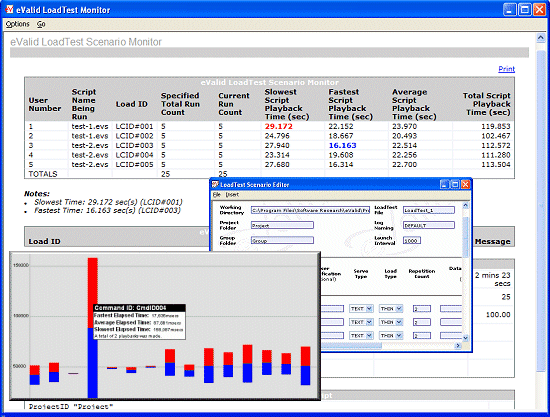Overview
eValid's approach to imposing server load meets
the twin goals of total realism and complete reliability.
eValid's LoadTest engine has No Virtual Users!
Only simulated Actual Users that impose server load in real time.
Technical Approach
eValid's approach to server loading involves:
- Use of regular eValid
Functional Tests
in a LoadTest scenario.
- Parallel execution of multiple eValids under central control.
- Independent, repeated operation of each functional test.
- Inter-browser data collection and consolidation.
- Cacheless operation for maximum accuracy for all tests.
LoadTest Script Composition
Here are some of the features you can program into an eValid LoadTest script:
- Name of the actual functional test script being played back.
- Accounting group to which to assign this simulated "LoadTest User".
- Page serve type (Full or Text).
- eValid LoadTest engine type (Full, Thin, or Lite).
- Playback repetition count.
- Parameter values (in-line runtime data substitutions).
Smart Script Creation
eValid LoadTest scripts are exceptionally easy to create, using the
eValid recording GUI.
You can also use test scripts you have already created in your
Regression Test Suite.
Scenario Editor
eValid LoadTest runs are composed of
sets of eValid functional test scripts
composed into a special LoadTest script.
eValid's LoadTest uses a LoadTest script
to launch the specified number
of independent eValid browsers,
each playing back the specified functional test.
There is a powerful LoadTest
Scenario Editor that composes your load testing scripts with the click of a button.
LoadTest Results Display: Scenario Monitor
During an eValid run with 10's or 100's of eValid browsers running
independently of each other,
the eValid LoadTest system accumulates key data
for your use to assess how well the server is performing:
The eValid Scenario Monitor shows
the current status of all eValid copies you have running, in real time!
The dynamic display shows you:
- Name of functional test script
- Assigned LoadID for playback time result accumulation
- How many times each eValid copy has exected its assigned script
- Maximum run count
- Minimum, average, and maximum script playback times measured
LoadTest Results Display: Timing Chart
The data from all of the eValid playbacks is kept internally and aggregated
through use of the assigned LoadID.
You could assign the same LoadID to all of the scripts you're running or
you could assign a different LoadID to each script, or any combination.
At the end of the run the eValid LoadTest Timing Chart shows you
the minimum, average, maximum and standard deviation time for all tests run under each
LoadID.
Licensing Approach
eValid LoadTest is licensed based on
the total number of machines you use to impose load on your server cluster.
You are free to run as many eValid copies on each machine as you wish,
subject only to the available RAM and other capacities of each machine.
There is no per-actual-user fee to worry about.
Extra playback-only machines
or extra Infinite User Key (IUK) weeks are very moderately priced.
Sample Screen
Here is a sample image of evalid LoadTest reports.
|
Key Benefits
Here are a few of the key features of eValid LoadTest:
| | • |
Realistic functional tests.
Realistic server loading.
|
| • |
Load your server with 50+, 100+, 500+, 1000+
LoadTest user sessions.
|
| • |
eValid functional tests can play back ANY browser sequences.
|
| • |
Point and Click LoadTest scenario editor.
|
| • |
LoadTest scenarios use any functional test scripts.
|
| • |
Leverage tests from your regression test suite.
|
| • |
LoadTest playbacks are fully "stateful," maintain user context.
|
| • |
No virtual users!
No virtual user licensing fees.
|
| • |
Available Infinite User Key (IUK) weeks
for multi-machine loading experiments.
|
| • |
Reliable and revealing LoadTest Reports.
|
| • |
LoadTest solution scales up well.
|
| • |
Tests behave as real users.
Your servers see actual users behavior, not approximations.
|
|
|
